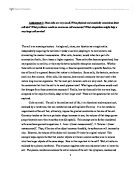Most people do not have any distinct symptoms early on. Two months after the first exposure to the virus infected persons may experience flu-like symptoms such as fever, headache, depression and expanded lymph nodes. However, these symptoms vanish after a month or so causing people to usually think that it is just another viral infection. (3)
"More persistent or severe symptoms may not surface for a decade or more after HIV first enters the body in adults, or within two years in children born with HIV infection. This period of 'asymptomatic' infection is highly variable. Some people may begin to have symptoms in as soon as a few months, whereas others may be symptom-free for more than 10 years. During the asymptomatic period, however, HIV is actively multiplying, infecting and killing cells of the immune system. HIV's effect is seen most obviously in a decline in the blood levels of CD4+ T cells (also called T4 cells) - the immune system's key infection fighters. The virus initially disables or destroys these cells without causing symptoms." (3)
HIV causes the immune system to weaken and then eventually just stop working altogether. Therefore one of the symptoms for a person is swollen glands or lymph nodes. A few months before the patient is infected with the AIDS virus they may have symptoms such as "lack of energy, weight loss, frequent fevers and sweats, persistent or frequent yeast infections (oral or vaginal), persistent skin rashes or flaky skin, pelvic inflammatory disease that does not respond to treatment, or short-term memory loss." (3)
Preventing HIV and AIDS is a very difficult process. Unless people are more responsible and feel the need to take control of their own actions, there is no way to fight this disease. Many people are still living with the impression that they are invincible and therefore, cannot be touched by the AIDS virus or the HIV infection.
Right now there are no known completely effective cures for AIDS or HIV. There are drugs called anti HIV drugs which are also known as nucleoside analog reverse transcriptase inhibitors. These basically prevent the virus from replicating itself or delay the spreading of the infection and also prevent the infection from affecting the body. (3)However, these drugs are not completely reliable and the effects of the drugs themselves do not last long. Eventually despite everything, the infection will spread and affect the immune system, making the body susceptible and vulnerable to other diseases and infections, then leading the patient to get AIDS.
There is no vaccination one can take to avoid the HIV virus. The most affective cure for HIV/AIDS is prevention. The only form of prevention is safety and responsibility. Many people say that only gay people can get HIV or AIDS, which is not true. HIV can infect anyone who is sexually active, has been injected with an infected intravenous needle, or who gets a blood transfusion without proper screening. The fact is that there is no cure for this disease to date and the only way people can deal with it is by blaming a certain type of person, and somehow convince themselves that they are not at risk. This is a dangerous mentality because this means that nobody is careful and that then causes people to be irresponsible and not to be careful.
WWW Sources







